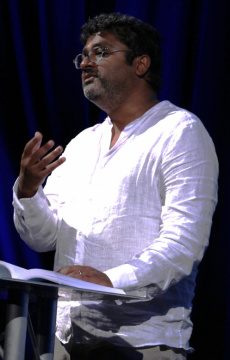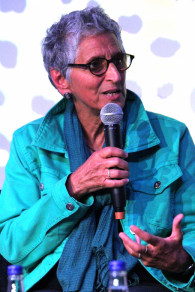The beauty and the pain: a view of strife-torn Sri Lanka, by more than 100 poets

“The time is right – the moment is now – for the world to know Sri Lanka better: its beauty and its pain.” These words come from the introduction to a new anthology of Sri Lankan and diasporic poetry that concentrates on work published after Independence in 1948, and does not shrink from addressing civil war atrocities, tsunami trauma, and the general “explosiveness” of Sri Lankan history, which erupted once more in 2022, when Buddhists, Hindus, and Muslims combined to storm the residence of the president.
The anthology, Out Of Sri Lanka (Bloodaxe Books), featuring over 100 poets writing in English or translated from Tamil and Sinhala, was launched at Newcastle University’s Culture Lab, as part of a South Asian festival staged by Gem Arts, with additional involvement from Newcastle’s Centre for the Literary Arts (NCLA). Its three editors, Vidyan Ravinthiran, Seni Seneviratne, and Shash Trevett, pictured above, based in the UK or US, were there to read from their own works and other writers in the anthology. There were also filmed contributions from a number of poets.
Shash Trevett, a poet, critic, and translator of Tamil poetry into English, who lives now in the UK after enduring family trauma and atrocities during the civil war, said that poetry was very important for Sri Lankans: “You grow up with it. Grandparents speak to you in wordplay and riddles after dinner.” Poetry kept going during the troubles, when other forms of writing “died a death”. A staunch pacifist, she writes almost exclusively about the civil war, and its aftermath for civilians.

The film section of the reading included the heartrending ‘I could Forget All this’ by Tamil poet Cheran; an extract from Sandaresee Sudusinghi’s poem about the burning of the Jaffna Public Library in 1981; and another extract, from ‘The Motherless Two’ by Ratna Sri Wijesinghe.
Vidyan Ravinthiran’s poem ‘Ceylon’ is partly about taking tea (“Tetley’s tastes of nothing, but I suppose / it’s good to know true flavourlessness, / the prose of life we sugar over with verse”) and partly about the true meaning of ‘home’, for both himself and his parents. He also read Regi Siriwardena’s ‘Birthday Apology and Apologia’, about reaching 80 when “others died of violence and had much more to give”.

Shash Trevett’s poems included ‘The Sinhala Only Act, 1956’, when Tamils, a people without a country, took to the streets. She also spoke of the toll it took to put the anthology together: “I started off with black hair, and ended up with grey. I was having to negotiate my own baggage, along with everyone else’s baggage … I was on the point of collapse.” She reckoned that she translated about 45 poems. But she also paid tribute to Neil Astley at Bloodaxe for “giving us complete freedom”.
Vidyan Ravinthiran said they had been interested in all kinds of poem for the anthology, “post-lyric, hybrid poems by younger poets, modernistic experimentation”. He also told the packed audience that “a kind of resilient, gallows humour links many of the poems. It’s always been there in my family.”




